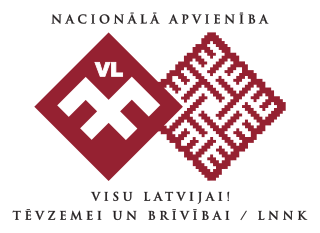
The politics of Latvia takes place in a framework of a parliamentary representative democratic republic, whereby the Prime Minister is the head of government, and of a multi-party system. The President holds a primarily ceremonial role as Head of State. Executive power is exercised by the government. Legislative power is vested in both the government and parliament, the Saeima. The Judiciary is independent of the executive and the legislature. The Economist Intelligence Unit has rated Latvia as "flawed democracy" in 2017.
The Socialist Party of Latvia was formed in 1994 as a successor party to the Communist Party of Latvia, which was banned in 1991. In essence, the party is communist; according to the programme of the party, the LSP was founded as an organization upholding socialist ideas after the 1991 events that the party describes as a 'counter-revolutionary bourgeois-nationalist coup'.

Latvian Way was a conservative-liberal political party in Latvia. It merged with Latvia's First Party to form the Latvia's First Party/Latvian Way (LPP/LC) in 2007.

The Latvian Social Democratic Workers' Party is a social-democratic political party in Latvia. It has a long history but is not currently represented in the parliament of Latvia.
The Latvian Green Party is a green political party in Latvia. It was founded on 13 January 1990 and is a member of the European Green Party. Unusually for a green party in Europe, the LZP is generally considered a centre-right party. Leading politicians of the party have often supported reactionary, nationalist, and anti-LGBT positions. The party has only gained representation in the Saeima by forming electoral alliances with other parties.

The New Era Party was a centre-right political party in Latvia. Founded in 2002, the party merged with Civic Union and Society for Other Politics to form Unity in 2011.

Parliamentary elections were held in Latvia on 5 October 2002. The New Era Party emerged as the largest party in the Saeima, winning 26 of the 100 seats.

Parliamentary elections were held in Latvia on 3 October 1998. The People's Party emerged as the largest party in the Saeima, winning 24 of the 100 seats.

Parliamentary elections were held in Latvia on 5 and 6 June 1993, the first after independence was restored in 1991. Latvian Way emerged as the largest party in the Saeima, winning 36 of the 100 seats. A total of 23 parties participated in the elections, although only eight received 4% or more of votes and won seats. Voter turnout was 91.2%, the highest in the country's history. Only 66–75% of Latvian residents qualified to vote, with the majority of those not able to vote being Russian.

The Latvian Russian Union (LKS) is an ethnic minority, left-wing political party in Latvia, supported mainly by ethnic Russians and other Russian-speaking minorities. The co-chairpersons of the Latvian Russian Union are Miroslav Mitrofanov, Yuriy Petropavlovsky and Tatjana Ždanoka.
The European Parliament election of 2004 in Latvia was the election of MEP representing Latvia constituency for the 2004-2009 term of the European Parliament. It was part of the wider 2004 European election. The vote took place on June 12.

The National Harmony Party was a political party in Latvia.

For Fatherland and Freedom/LNNK was a free market national conservative political party in Latvia. In 2011, it dissolved and merged into the National Alliance.
The European Parliament election of 2009 in Latvia involved the election of the delegation from Latvia to the European Parliament in 2009. 17 lists containing a total of 185 candidates were registered for the election.

Parliamentary elections were held in Latvia on 2 October 2010. It was the first parliamentary election to be held in Latvia since the beginning of the economic crisis during which Latvia had experienced one of the deepest recessions in the world.

The Christian Democratic Union is a minor Christian-democratic political party in Latvia. It is currently led by Māra Viktorija Zilgalve and Secretary General Armands Agrums.

Parliamentary elections were held in Latvia on 6 October 2018.

The National Alliance, officially the National Alliance "All For Latvia!" – "For Fatherland and Freedom/LNNK", abbreviated to NA, is a right-wing populist, national-conservative political party in Latvia. With thirteen seats in the Saeima, the National Alliance is the fourth-largest party in the national parliament and the third-largest party in the government. The party is a coalition of conservatives, Latvian ethnonationalists, and economic liberals.

Early parliamentary elections were held in Latvia on 17 September 2011, following the country's first parliamentary dissolution referendum held on 23 July 2011. The previous parliamentary election was only held in October 2010.

Parliamentary elections were held in Latvia on 4 October 2014. The previous elections were held in 2011, but according to the country's constitution, the parliamentary term was reduced to only three years following early elections.

















